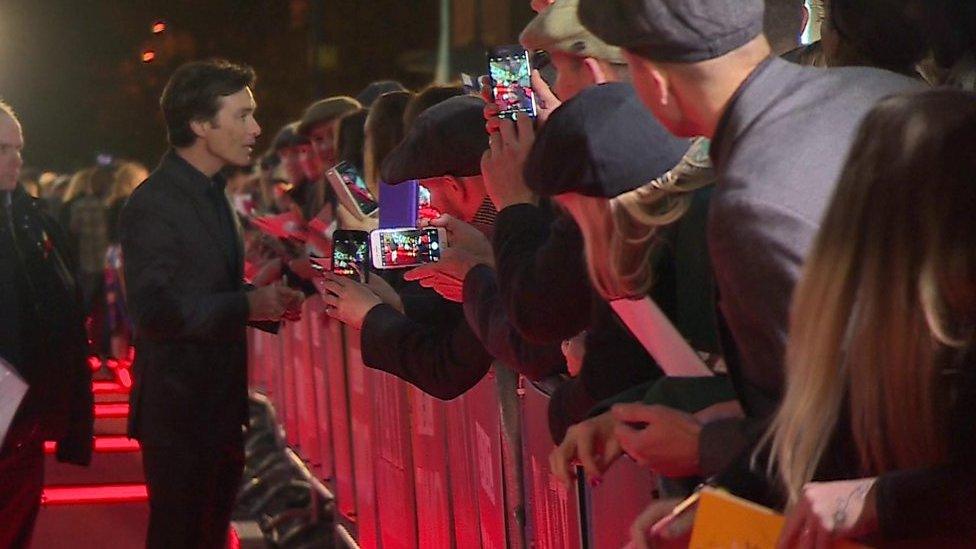Exclusive: Hayley Atwell calls for 'predator' Weinstein to be punished
- Published
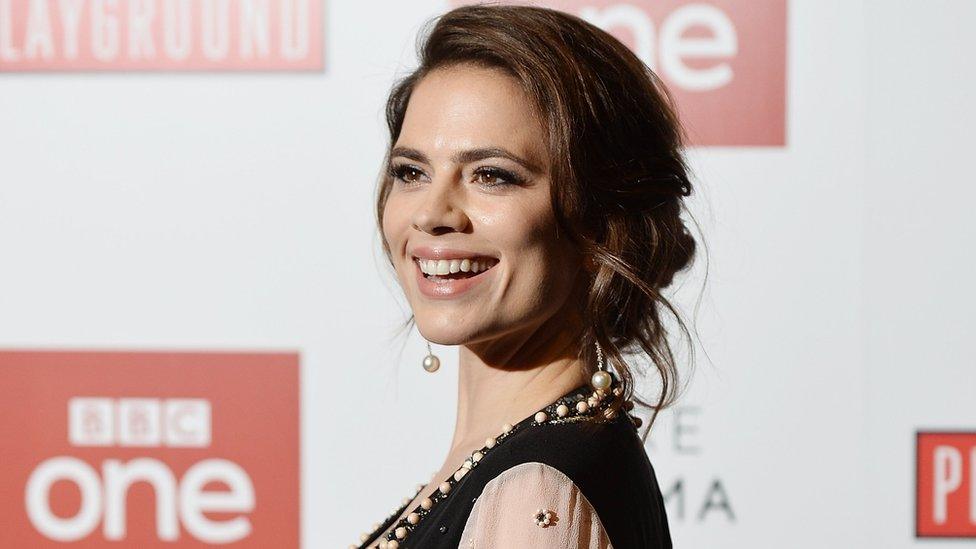
"He had a very dark presence and a dark charisma."
Actress Hayley Atwell is talking about disgraced movie mogul Harvey Weinstein, whom she has met twice at public events. She counts herself "incredibly lucky" at never having been left alone with him.
"I don't think he's a sex addict - I think he's a predator," she says. "He harassed women and therefore he should be punished in the highest way the law offers."
The 35-year-old, best known for her role as Peggy Carter in the Captain America films, also wants to set the record straight about being labelled a "fat pig" by Weinstein.
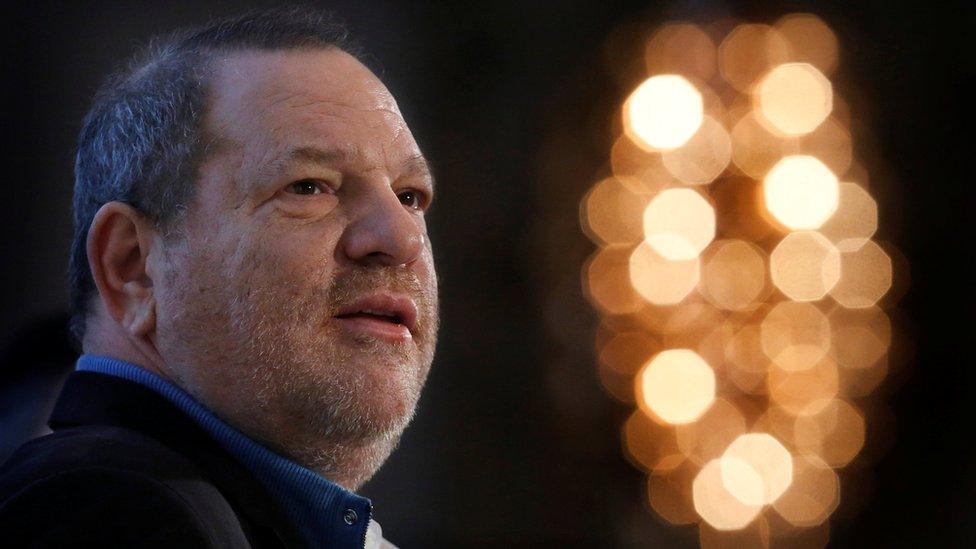
Atwell believes Weinstein "should be punished in the highest way the law offers"
A story, external recently surfaced that the powerful producer told her over lunch, during the 2007 filming of Brideshead Revisited, that she looked like a "fat pig" on screen and ordered her to lose weight.
Her co-star, Emma Thompson, then allegedly reprimanded Weinstein telling him he was a misogynist and a bully, threatening to quit the film.
Atwell says that's not the way things happened.
"I was asked how I would feel, given I've got a curvy body, about losing weight - because 1920s flapper girls did not look like that," she explains.
"It was put to me in a delicate way, very discreetly, very subtly - by someone not related in any way to Harvey Weinstein.

Hayley Atwell with co-stars Matthew Goode and Ben Whishaw in Brideshead Revisited
"But the question was enough to anger Emma [Thompson] who said to me very clearly: 'You are a very good actor. You are not a model. This is a very dangerous path if you start to succumb to the wishes of Hollywood to make you look a certain way. If they ask you again, not only will I walk off the set but I'll take this issue to the press.'
"She was extraordinary about it."
The actress, who is starring in a new BBC adaptation of Howards End, says she was "upset" about the term "fat pig" suddenly being bandied around in relation to her.
"No one has spoken to me rudely about my weight, ever," she says. "And in fact, one of the least interesting things about any of the work I've done is how much I weigh.
"I find it another way of controlling women."
'You normalise it'
Atwell says she can't remember having directly experienced sexual harassment at work.
But says she "can see that it happens", adding she has "instinctively had a feeling of it" when she walks into a room of powerful men.
"I've been groped in the street a number of times. I've received lots of sexually explicit messages on Instagram and had drunk men at bars coming up to me. You normalise it."
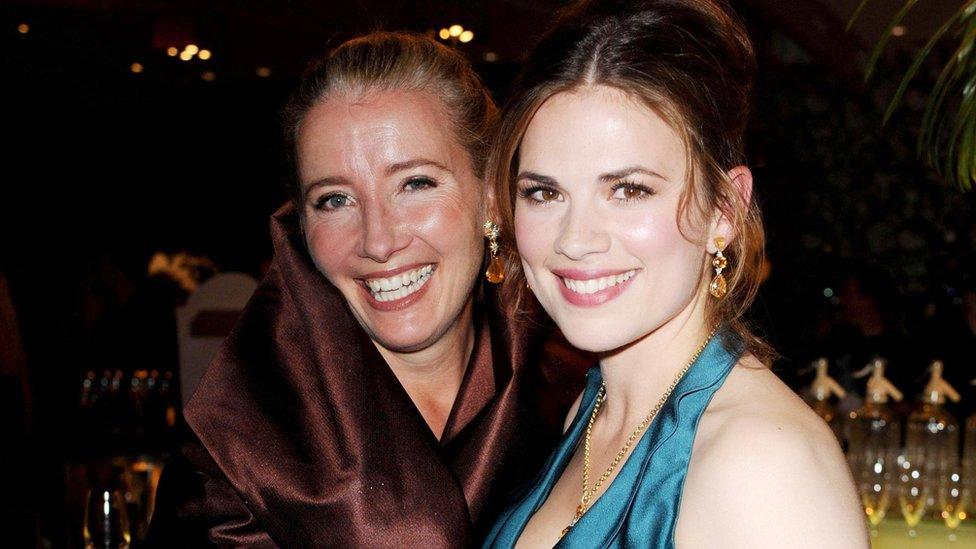
Hayley Atwell describes Emma Thompson as a "friend and mentor"
The actress views the allegations from women across various industries in the wake of the Harvey Weinstein scandal as an "exciting opportunity".
"There is something quite extraordinary that's happening now," she says. "Everyone is talking about it and everyone's addressing it.
"I think certainly people who have harassed women in the past are probably shaking in their boots because they are expecting to be exposed at any time.
"And that in itself is a potentially very exciting opportunity now to create a much, much safer working environment, especially for the next generation of young women coming up."
Atwell adds it's also about "teaching young women not to just accept it as the norm anymore - because that norm is changing."
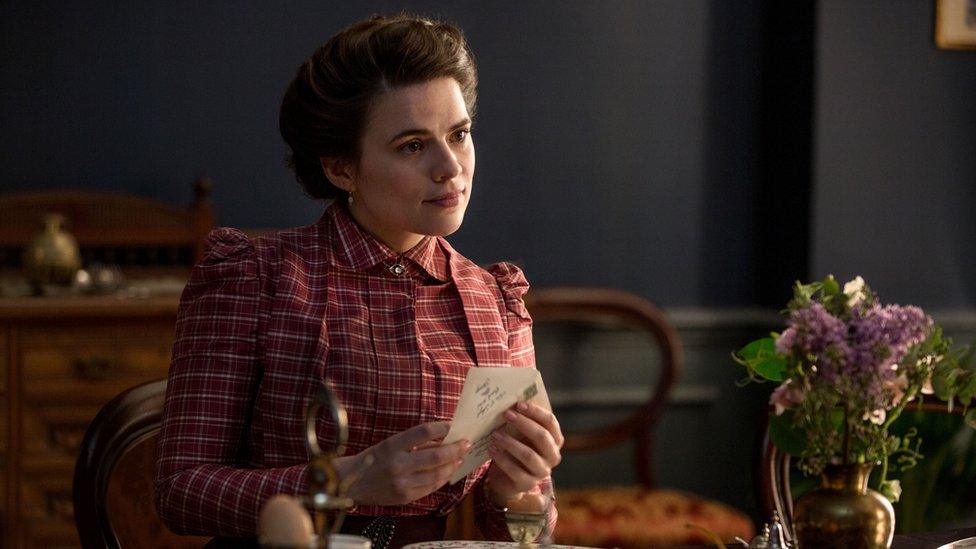
Hayley Atwell as Margaret Schlegel in Howards End
Atwell is starring in a new BBC adaptation of EM Forster's Howards End, as the vivacious and headstrong Margaret Schlegel in turn-of-the-century Britain.
The four-part series is a colourful, vibrant portrayal of Edwardian society. The characters are dressed in bright reds and blues - rather than the muted colours you might typically see in a period drama.
Margaret and Helen Schlegel (Phillipa Couthard) feel modern and relatable - they really move around the screen, literally running around. The sisters speak over each other and squabble, as well as console each other, as families today would.
'Humour and wit'
Atwell says they wanted to dispel the idea of women back then being "stiff-mannered" and "austere".
She puts this misconception down to the fact that photographs took so long to take that everyone had to freeze.
"We managed to find an archive of action shots of Edwardian women," Atwell explains. "They're blurry but you can see them striding down the street - skirts swaying in the breeze, books and cigarettes in hand, laughing and knocking their heads back.
"They spoke like we do, they had movement, they had energy, they had a great sense of humour and wit."
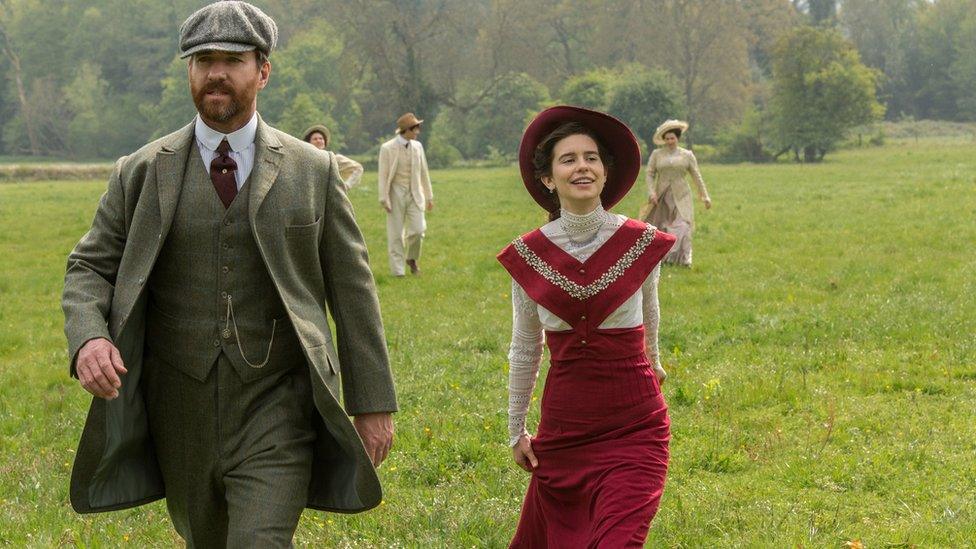
Matthew Macfadyen plays Henry Wilcox while Phillipa Coulthard plays Helen Schlegel
Equality of the sexes comes up as a strong theme in the series, with the Schlegel sisters striving for a more equal society. This is in direct opposition to matriarch Ruth Wilcox, who claims it's best to "leave action and discussion to men".
Despite this, it's Mrs Wilcox who has the power in her family.
Atwell sees feminism both in Howards End and the here and now as a complex and contradictory matter.
Asked whether she classes herself as a feminist, she hesitates before vehemently declaring: "I am!"
"But I have to be clear about what my definition of feminism is," she adds. "And feminism to me is not women, women, women - it's equality between the sexes."
'Too scared'
Asked about whether she has experienced the negative effects of gender pay disparity, she muses: "I wouldn't be surprised if I had been and not known it at the time.
"Before, I was too scared to find out. It's not nice to find out you've been played or undermined or considered your contribution worth less because of your sex."
It's this pay gap, she decides, which is crucial to the overall attitude towards women in society.
"That then trickles down into social interaction, into how men and women can normalise the undermining of women, the stereotype of being a bimbo, of body-shaming women to still believe that they're not enough until they are a size zero."
It's all part of a bigger picture where women are "still patronised and condescended to and spoken down to", she believes.
So what's the solution? Well, not "stamping feet and hating men" says Atwell, which she deems "childish, immature and reductive."
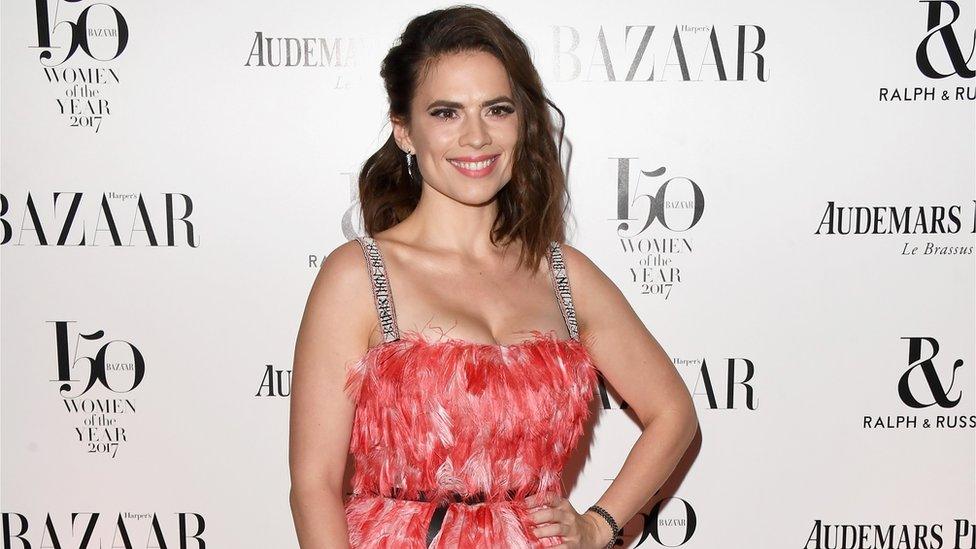
Atwell sees the fall-out from the Weinstein scandal as an "exciting opportunity"
Atwell says it's about the "calling out of abuse of power when people see it", and realising "it's no longer acceptable to do certain things in the work place."
It's also having multi-faceted female roles on screen.
"I'd certainly love to see the women I come across in everyday life being better represented," says Atwell.
And it's the strong-willed, dynamic Margaret Schlegel roles in life which Atwell says influence younger generations of women to think "oh, that's what I could do! Oh, that's the part I could take!"
It's unclear if she means in real life or on the screen. Then again, she could mean both.
Howards End begins on BBC One at 21:00 GMT on Sunday 12 November.

Follow us on Facebook, external, on Twitter @BBCNewsEnts, external, or on Instagram at bbcnewsents, external. If you have a story suggestion email entertainment.news@bbc.co.uk, external.
- Published24 February 2023
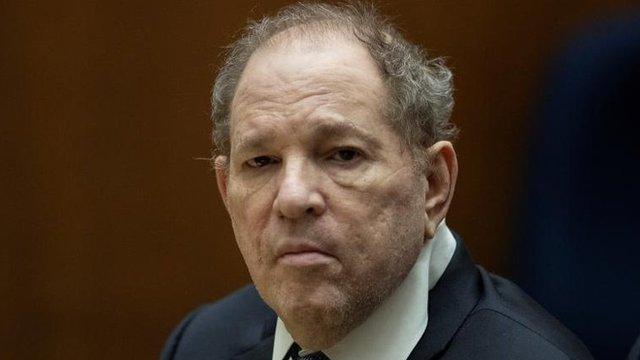
- Published12 October 2017
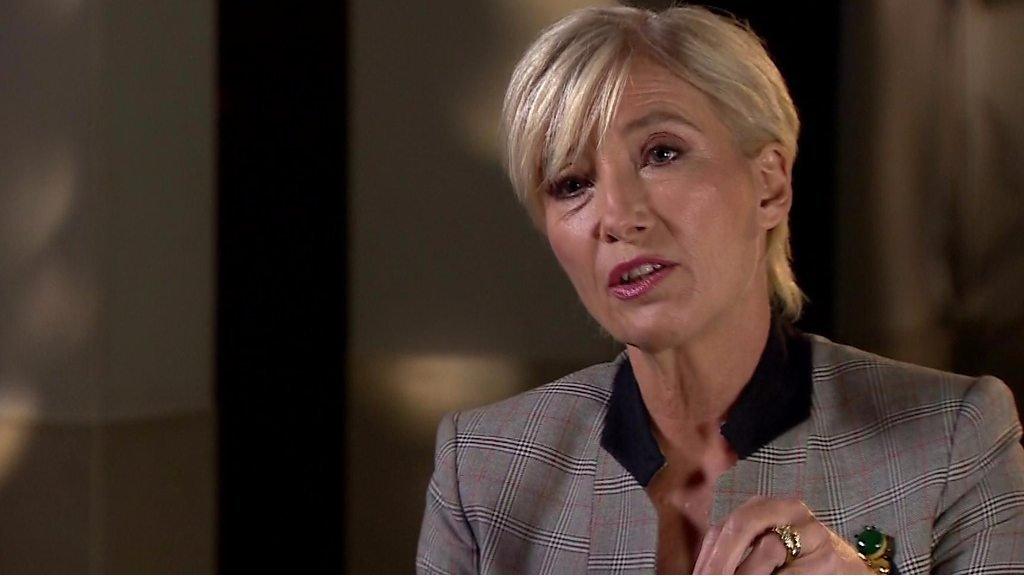
- Published30 October 2017
